
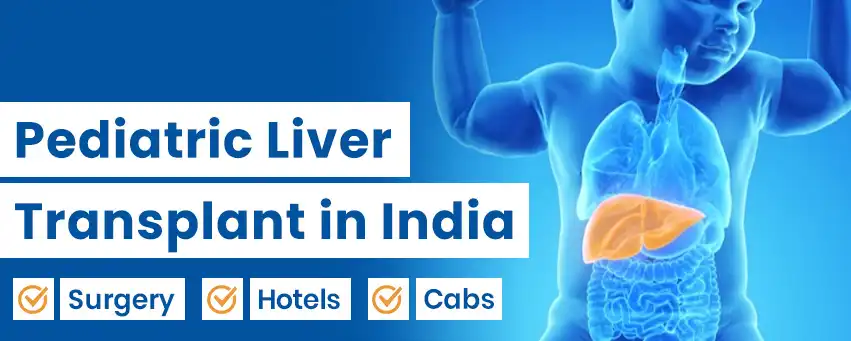
A pediatric liver transplant is a surgery performed on infants and kids at a young age. It is a more sensitive and complex procedure for treating babies' livers. Also, it is a surgical process where the affected part of the child's liver is replaced with a portion of adult or kid live donor to restore the normal liver in the baby. For a child liver transplant, a donor must qualify the national donor criteria to donate a liver or portion of their liver for a child's liver transplantation.
A family member or a parent can also donate a liver for the child's liver transplantation process. Donating part of your liver to a family member requires meeting the live liver donor criteria including the liver donor age limit. There can be several reasons why a child may need liver transplantation. There can be several causes why a child may need liver transplantation. The most common cause of pediatric liver transplant is biliary atresia, a rare liver disease in infants and babies. However, proper care and timely diagnosis can ensure a safe and successful transplant. Today, we will discuss everything about a pediatric liver transplant in India, including conditions indicating a liver transplant, common symptoms, procedure, donor qualifications, and more.
Mr. Rachid Echadli and Mrs. Fatima Zahra came all the way from Morocco to India for their daughter's liver transplant surgery. Their baby was only four months old when she was diagnosed with congenital liver disease. The only option was a liver transplant to cure the liver cirrhosis the baby had. Dr. Giriraj Bora has done the surgery successfully at JCI-accredited Artemis Hospital in Delhi, India. The mother was the living liver donor. Both the mother and the baby are well now. Listen to their words by clicking on the play button:
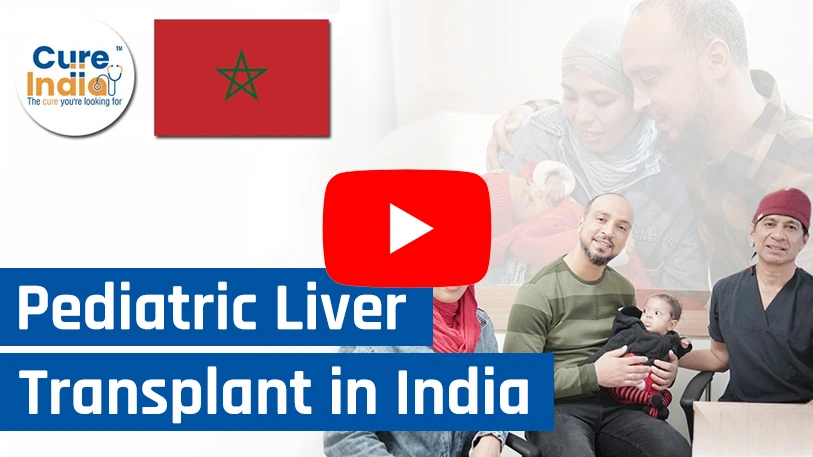
A pediatric liver transplant is a complex and delicate surgical procedure that replaces a diseased liver (portion of the liver) of a child or infant with a healthy liver or part of the liver from a donor. A child liver transplant can be done with a deceased donor transplant or a live donor transplant.
In a deceased donor transplant, the liver or portion of the liver is taken from a donor who has recently died. On the other hand, in a live donor transplant, the liver or part of the liver is sourced from a living person who has volunteered for the liver donation. Also, the potential donors must qualify for the donor criteria. Before surgery, they must be physically healthy and undergo all the essential tests, such as blood, sugar, and other tests.
Children and infants need to undergo a liver transplant due to several reasons or conditions. They might have or have been suffering from a disease that has damaged the liver or caused impairment. Also, some rare disease that does not harm life but can affect other organs requires a liver transplant. In addition, a large tumor in the liver that cannot be removed without removing the liver needs a liver transplant.
Biliary atresia is the most common cause of pediatric liver transplant. The other common reasons are as follows:
Pediatric liver transplant is mostly required in cases where the liver of the baby is damaged, whether wholly or partially, due to disease, genetics, birth complications, and so on. A damaged or affected liver can cause several symptoms that indicate that your child may need an infant liver transplant.
Here are some common symptoms that suggest your kid may need an infant liver transplant:
The pediatric liver transplant evaluation process can be overwhelming for a child's parent. The procedure is time-consuming and requires a wide range of tests before the transplantation occurs. Here are some standard details of pediatric liver transplants happens:
In addition to all the technical tests, parents of an infant liver transplant patient may need pre-surgical psychological counseling for evolution.
With the advancement of medical science, many new and effective techniques have surfaced for human welfare, and one among them is a pediatric live-donor liver transplant. A live liver donor transplant is a surgical procedure where a liver or portion of the liver (of a child or infant) is removed, which is no longer functioning, and replaced with a new and healthy liver or part of the liver from a live donor.
Earlier liver transplants were used to replace the affected liver with a healthy liver from a diseased donor. But now, any qualified person can donate a liver for a pediatric liver transplant. Also, these types of liver transplants have a higher success rate than the previous one (pediatric diseased donor liver transplant). The donor surgery can be both open as well as minimally invasive procedures. CureIndia surgeons evaluate the donor and do the suitable procedure.
Getting a liver from a live donor for your child's liver transplant has a higher success rate. However, only some are eligible for the task. A donor must meet all the essential living liver donor qualifications to donate a liver for a pediatric liver transplant. Here are the crucial criteria for a live liver donor willing to donate liver for a liver transplant. Check all these criteria if you are considering donating part of your liver to a family member.
A portion of the liver from a deceased or alive person can be used for an infant liver transplant. However, there are many benefits of pediatric live-donor liver transplant. Here are some benefits of getting a live liver donor:

When deciding on a pediatric liver transplant in India, knowing the surgeon is extremely important. Only an expert surgeon whom you can trust should be chosen for your child's treatment. CureIndia liver transplant surgeons are some of the few specialists.
Dr. Giriraj Bora has an experience of over 1,500 liver transplantations. He has expertise in gastrointestinal diseases, living donor liver surgery, pediatric liver surgery, etc.

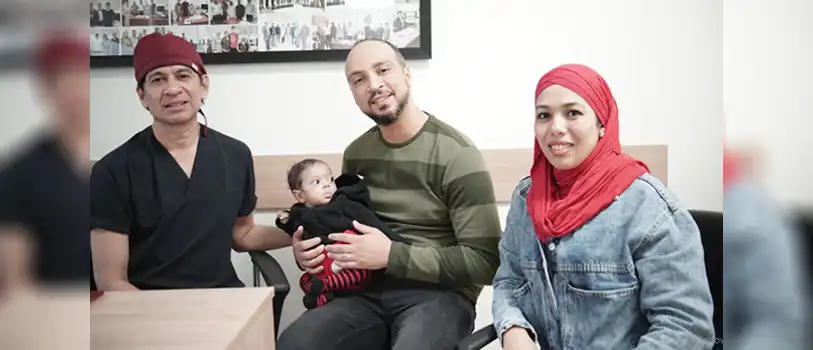

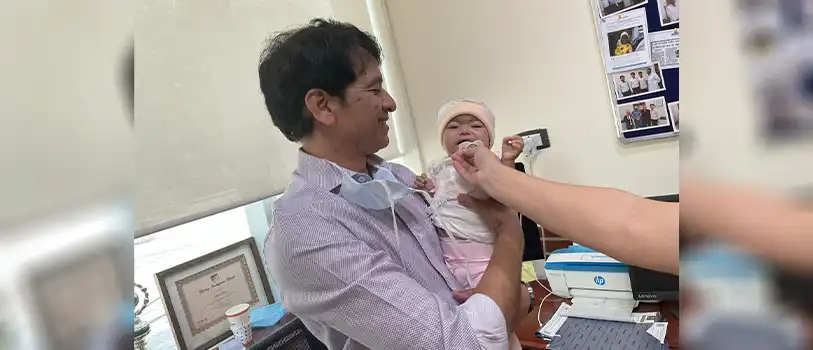
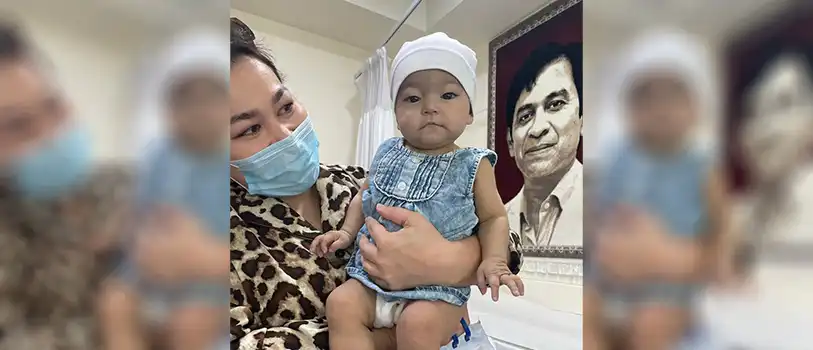
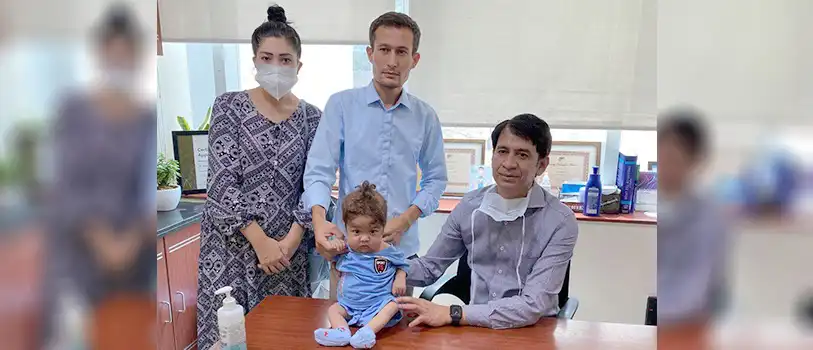



The cost of a pediatric liver transplant in India is around $24,000, depending on the hospital, city, and complexity of the case. Factors influencing the cost include the type of donor, surgical team expertise, post-operative care, and length of hospital stay. Here is the cost of pediatric liver transplant in India with CureTurkey:
| Treatment Name | Cost in India | Stay in India |
|---|---|---|
| Pediatric Liver Transplant in India | $24,000 | 45 - 60 Days |
Physical and mental health evaluation of both the donor and the recipient is necessary before considering a pediatric liver transplant in India. Different transplant teams will be assigned to care for the recipient and the donor. The procedure of a living liver transplant surgery for an infant can be life-saving, but it also has some risks. Certain aspects like the compatibility of blood groups, physical and mental health, organ size, and age (both donor and recipient) should be considered before the transplant.
The surgery will begin only after your child has responded to the anesthesia and IV lines have been inserted. A registered nurse will monitor your child's vital signs and urine output throughout the procedure. A pediatric surgeon, anaesthesiologist, and other technicians will be in the operating room.
The pediatric surgeon will start the procedure by applying antiseptic and putting drapes on the surface of the operating site. After that, the surgeon will remove the non-functional liver and transplant the new, healthy liver in its place. The new liver should look soft and pink as blood will flow into it after the vessels are connected. The next step will be joining the bile ducts of the recipient and the donor's liver. Blood products will be provided to your child throughout the process if needed.
The procedure generally lasts for 4-8 hours. A transplant team member will update you about the surgery once every hour. After completing the course, your child will be sent to the Paediatric Intensive Care Unit.
Both the recipient and the donor go through surgical procedures for pediatric liver transplant. Here, we will discuss the recovery periods for liver transplant donors and recipients.
An older child should stay for at least ten days, and an infant for 10-14 weeks in the hospital after the pediatric liver transplant. During this time, they receive care from the Paediatric Intensive Care Unit and are monitored by physicians and nurses.
A donor of a liver transplant also needs to stay in the hospital for 5-7 days and pause their work for 4-6 weeks for recovery from donating liver. They can resume their everyday lives after six weeks of the surgery.
To prepare for the procedure, the infant or child recipient will be given IV fluids through an IV line to draw back the blood. You may also need to sign consent forms for the surgery and anesthesia.


Successful Liver Transplant Surgery in India
Share Your Reports
Minimally invasive Liver donor surgery
Book appointment